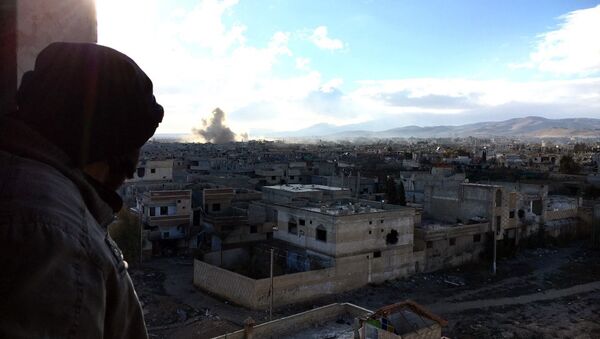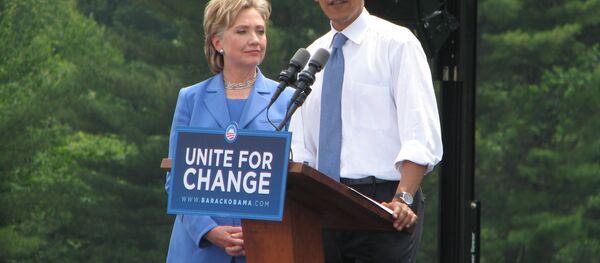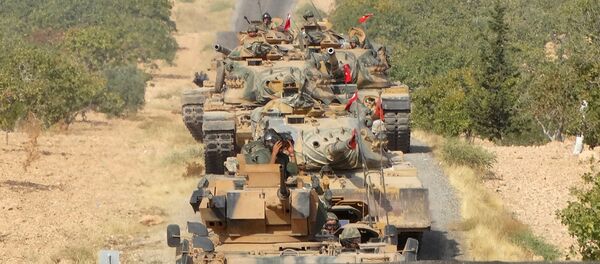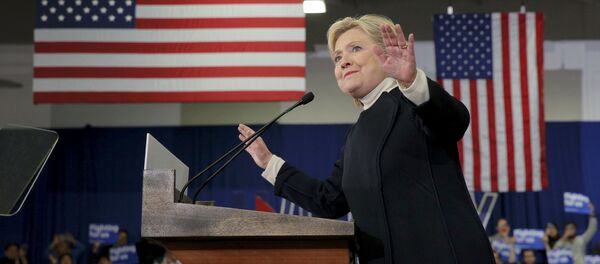President Barack Obama's critics insist that the major flaw in the US' Syrian policy is the White House's reluctance to send US boots on the ground and to provide Syrian President Bashar al-Assad's opposition with more weapons.
However, "the easy answer is that the whole idea that there was a viable non-extremist force to be strengthened is a myth — albeit one that certain political figures in London and Washington refuse to give up," US investigative journalist Gareth Porter writes in his opinion piece for Middle East Eye.
Furthermore, Porter underscores, the Obama administration was aware that "the external Sunni sponsors of the war" against the Assad government in Damascus — most notably the Gulf States — "were channeling their money and arms to the most sectarian groups in the field."
Instead of restraining its Sunni allies in the Middle Eastern region, the White House gave them the green light back in March 2012, seeking to oust Bashar al-Assad.
According to Porter, it was irresponsible on the part of the Obama administration to turn a blind eye to the rise of Salafist insurgents and Muslim Brotherhood radicals in Syria and to continue to promote the idea of "moderate" and "democratic" groups behind the 2011 uprising.
Thus far, the White House has upset the fragile balance of power in the region, he notes, stressing that "the consequences of the sectarian war will continue for years into the future."
Malik dispels the myth that Sunni Muslims in general were oppressed by the Assad government and denounces Ambassador Robert Ford's remark that "the Syrian Sunni Arab community views the Assad government as a greater problem than the Islamic State [Daesh]," as nonsensical.
"When Robert Ford claims that Sunni Arabs in Syria are more worried about Assad than the Islamic State, he is dangerously mistaken. Most of Ford's 'Syrian Sunni Arab community' remains in government-held areas and did not rise up. Damascus is an overwhelmingly majority-Sunni Arab city," Malik stresses.
"This obsession with supporting 'Sunni Arabs' has led the United States to support unruly and corrupt militias who happen to be Sunni and Arab, but aren't al-Nusra [Front], al-Qaeda, or ISIL [Daesh]… There are also Islamist insurgents such as Ahrar al-Sham, Faylaq al-Sham, or Nuredin al-Zenki (now famous for its latest beheading video). They fight ISIL [Daesh] only when it attacks them, and even then, many of their men are reluctant to fight against fellow Sunni Muslims," he elaborates.
Christopher R. Hill, former US Assistant Secretary of State for East Asia, believes that the Obama administration's policy toward Bashar al-Assad failed because of poor analysis of what was going on on the ground in Syria.
"The flaws in the Obama administration's appraisal of the Syrian crisis soon became apparent. Most obvious, Sunni radicals with foreign support quickly dominated the 'popular democratic movement'," Hill writes in his article for Project Syndicate, adding that as a result, Daesh has emerged in Syria.
"To be sure, many outsiders claim that radicalization was not inevitable, and that it occurred precisely because external powers like the US failed to intervene earlier and more forcefully. But studies indicate that the shift happened very early on. Indeed, the anti-Assad movement may never have been the enlightened democratic coalition that its international supporters claimed it was, at least not completely," the former US official highlights.
Porter poses the question whether top level Obama administration officials couldn't really foresee that a war to overthrow Bashar al-Assad "would inevitably become an enormous sectarian bloodbath."
"It took a remarkable degree of denial and self-deception for the Obama administration to believe that it was somehow acting to rescue the Syrian people from the bloodletting when it was doing precisely the opposite," he emphasizes.






